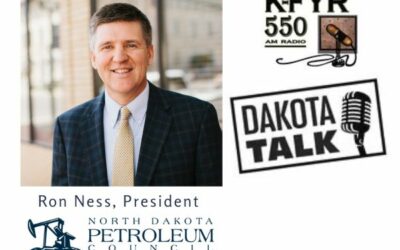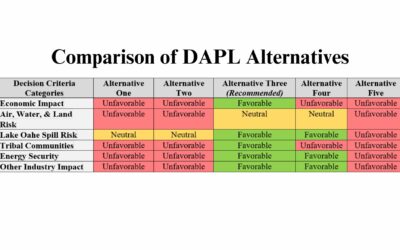
Ron Ness: The Truth About Bakken Air Quality
The American Lung Association recently reported (2022 State of the Air Report) that counties in the North Dakota oil patch had some of the cleanest air in the nation. That report is certainly great news for those people who live in work in western North Dakota. It is however, unfortunate and surprising that the Fargo Forum chose instead to report on an air quality study of questionable scientific validity.
The study in question, Natural Gas Flaring, Respiratory Health, and Distributional Effects, was the product of economists, not health professionals. Even the researchers admitted that the evidence they found was casual and not proven. Yet this so-called research was portrayed as fact by the Forum and its columnist Tony Bender.
The story went on to repeat flawed state-to-state comparisons of natural gas flaring by the Environmental Defense Fund, a well-known opponent of fossil fuels. That EDF analysis compared states whose natural gas is a byproduct of oil production and those who capture natural gas as the primary objective. That comparison, while sensational, is hardly fair.
Finally, the story quoted N.D. Rep. Finley-DeVille where she claimed widespread problems with “Bakken cough” at the McKenzie County hospital. Once again, Rep. Finley-DeVille is no medical professional; however, she is a well-known critic of oil and natural gas production.
In response to Ms. Finley DeVille’s claim, Pete Edis, CEO of McKenzie County Healthcare, countered “the Bakken cough is not a known diagnosis. MCHS is not in the business of diagnosing patients with illnesses that are unrecognized by mainstream medical organizations.” Once again, this claim is a less than credible and unsupported by the mainstream medical profession.
Here is what we do know as fact:
According to the American Lung Association, North Dakota’s oil and natural gas counties have some of the cleanest air in the nation.
Companies doing business in the Bakken have invested billions of dollars in natural gas capture and processing. The result has been a dramatic decrease in our state’s flaring. And we are only getting started.
We have invested billions of dollars more in new, high-tech pipelines to move oil, natural gas, and water byproducts, to take trucks off the road and improve public safety.
North Dakota’s oil and natural gas industry provides over 50,000 good jobs across our state.
We provide billions of dollars every year in state tax and royalty revenue that funds schools, roads, and healthcare.
Producing oil and natural gas here, in the US, instead of buying it from unfriendly countries is good for our nation’s security and economic prosperity.
The North Dakota Petroleum Foundation has planted over 200,000 trees to mitigate our impact on the environment.
And not only are we capturing more natural gas, but we are developing and deploying new technologies to reduce the impact of oil exploration on the land, air, and wildlife.
It is my hope that future stories about oil and natural gas production in North Dakota use credible sources for their information or, at least, attempt to validate information provided by these biased alternatives using facts from federal regulatory agencies and regional medical experts.
We recognize that we have more to do, but North Dakota’s oil and natural gas industry is committed to making the most of our state’s natural resources with the least possible impact on the land, environment, and people. After all, we live here too.
“It is my hope that future stories about oil and gas production in North Dakota use credible sources for their information or, at least, attempt to validate information provided by biased alternative using facts from federal and state regulatory agencies and regional medical experts.”
-RON NESS, PRESIDENT, NDPC
Other News
Ron Ness Guest Host on KFYR 550 AM Radio’s “Dakota Talk” Show on February 19, 2024
Ron Ness, President of the North Dakota Petroleum Council, was the guest host for the KFYR 550 AM Radio talk show "Dakota Talk" on Monday, February 19, 2024. Dakota Talk Guest Line-Up First Hour: Dale Hoerauf, Director of Career and Technical Education and Director of...
The Future of Oil and Natural Gas Industry in North Dakota Is Bright
OP-ED BY RON NESSWe all benefit from a strong oil and natural gas industry. The billions of dollars in taxes and royalties paid to the State of North Dakota each year pay for education, infrastructure, and social services across our great state. In fact, over 50% of...
NDPC Comments on Dakota Access Pipeline draft Environmental Impact Statement
The North Dakota Petroleum Council (NDPC) has submitted comment to the U.S. Army Corps of Engineers (USACE) on the draft environmental impact statement (EIS) for the Dakota Access Pipeline (DAPL) that was issued on September 8, 2023. DAPL serves as a vital connection...



